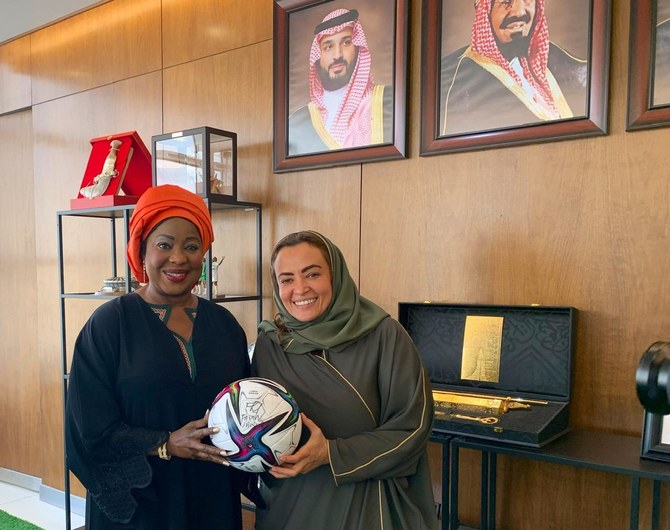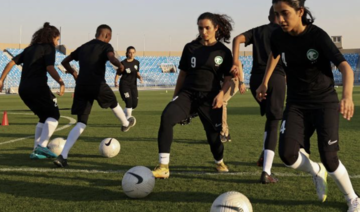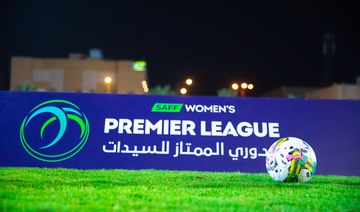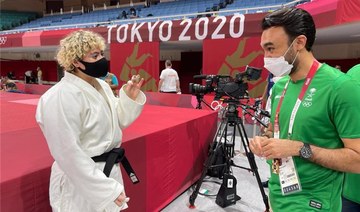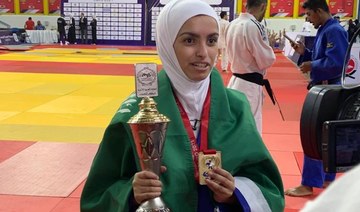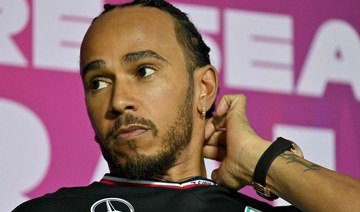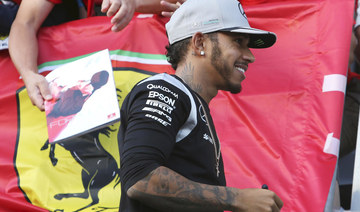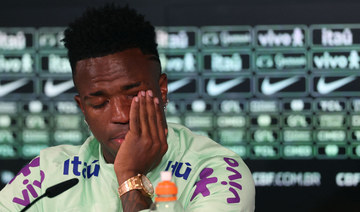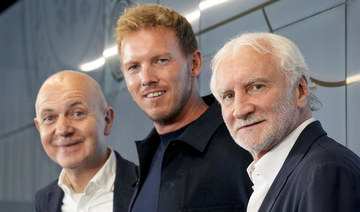Last Thursday football history was made in the Kingdom when the first-ever Saudi Women’s Premier League fixture took place between Al-Nassr and Sama at the Prince Faisal bin Fahd Stadium’s reserve pitch in Riyadh.
Over the following two days, six other teams — Al-Ittihad, Al-Ahli, Al-Hilal, Al-Shabab, Al-Yamamah and Eastern Flames — made their bows in the new competition organized by the Saudi Arabian Football Federation.
Arab News spoke exclusively to Lamia Bahaian, SAFF Women’s Football Department supervisor and board member, to get her thoughts on the landmark moment for Saudi sport.
Arab News: Tell us what this launch of the Women’s Premier League means to the federation and Saudi football?
Lamia Bahaian: I can confidently speak on behalf of everyone at the Saudi Arabian Football Federation that we were all extremely proud to finally see the moment come to life. The start of the premier league marked another historic milestone in the women’s game in Saudi Arabia. It forms part of our detailed strategy to grow the women’s game to new heights. We have clear set goals, and we are working tirelessly every day to achieve them. Thursday the 13th of October 2022 will go down in history for all the players and everyone who works tirelessly behind the scenes.
AN: In 2020 there was the Women’s Football League by Sports For All and in 2021 there was the Regional Football League. What lessons were learned from those two competitions that led to setting up the premier league?
LB: The 2020 Women’s Football League was organized by the Sports For All Federation under technical supervision from SAFF. It set great foundations for what was to come next. While it was a 9-aside community league, it still welcomed over 600 players from 24 teams, which are massive numbers.
We then organised our first 11-aside professional league, the SAFF Regional Women’s Football League, welcoming 16 teams across Riyadh, Jeddah and Damam and over 450 players. We adopted an interesting format where we crowned three regional champions, and then hosted the national championship in an eight-team knockout competition in Jeddah with Al-Mamlaka claiming the title.
Thanks to the leadership unconditional support and the Board of Directors’ trust in the future of women’s football, we were able to remarkably grow a community league in 2020 and a regional league last year to the Premier League in just over two years. Next month, we look forward to even welcoming the First Division League, where 17 teams will compete, taking the total number of teams across both competitions to 25! The champion from the First Division will make its way up to the Premier League, replacing the bottom placed team.
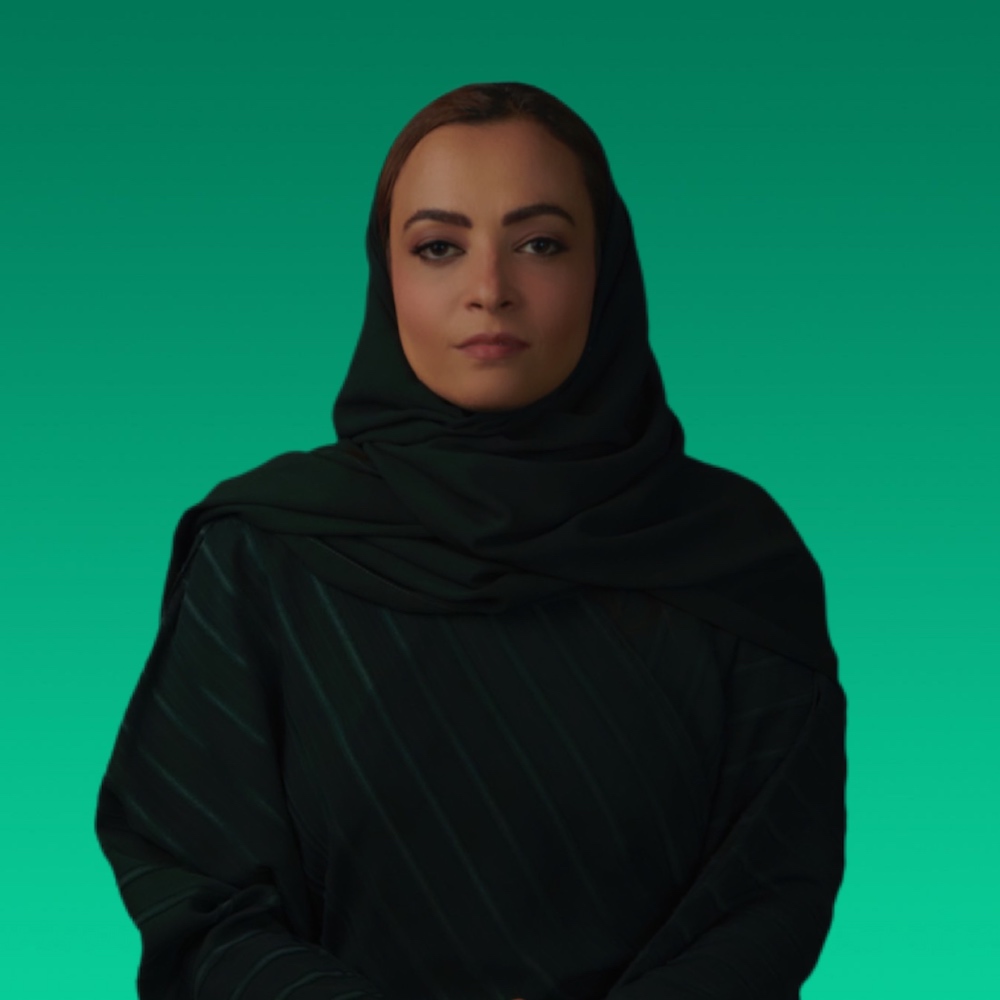
Lamia Bahaian says the ‘sky’s the limit’ for Saudi women’s football. (SAFF)
AN: How much of a benefit is it getting the established Saudi clubs like Al-Nassr, Al-Ittihad, Al-Ahli, Al-Hilal and Al-Shabab involved in the new league?
LB: The impact is huge on every level and cannot be underestimated. It represents a massive sign of commitment and trust from the wider game that women’s football is well and truly here to stay. And of course, the clubs help attract greater audiences and promote the women’s game to the masses which will hopefully inspire many young girls along the way to take up football as a profession.
AN: How do you rate the standard of players in the new premier league?
LB: The players have shown a fantastic level of football in the past couple of years and continue to surprise us each time. Whenever I speak to our technical staff, they are always full of praise of the standards being set every day. Our girls are extremely passionate about the game and it clearly shows on the pitch as they progress week in, week out. We believe with all the support we have, and the more minutes players get, the standard will continue to grow.
AN: Are there any particular players that you think have a big future in the Premier League?
LB: There are plenty of promising talent across all teams, from goalkeepers to rock-solid defenders to creative midfielders and goal poachers. We’ve been proud to see the levels go up from last year’s competition. There is a lot for Saudi football fans to be excited about and we invite fans to purchase their tickets to see for themselves. They are all hungry to put in their best performances and prove themselves over the next four months for a chance to feature in the national team.
AN: Tell us about the programs that the SAFF have set up to produce local coaches and referees?
LB: We are establishing a 360-degree ecosystem for women’s football in Saudi Arabia, and referees and coaches are an integral part to this transformation. In a short period, the results are staggering with over 900 D-, C- and B-licensed coaches and 49 qualified referees. Earlier this year, we hosted our first AFC B-License Coaching Course. Our national team head coach Monika Staab is playing a massive role in this growth. She arrived (in) Saudi Arabia last year with a wealth of experience growing the women’s game across the globe and everyone is learning from her on a daily basis.
AN: What sort of resources and facilities for training and matches can the new women’s football teams expect in the coming years?
LB: There has been rapid growth in women’s football, which mirrors much of the transformation across the Kingdom in many areas of life under the country’s leadership. All the foundations (are) laid for an exciting future ahead built upon a long-term strategy with clear player pathway, strong governance, competitions for every level, embracing technology and empowering people within the ecosystem.
Today, matches are being played at formal Ministry of Sport facilities for matches and are welcoming hundreds of fans. The opening weekend Jeddah derby between Al-Ittihad and Al-Ahli at the King Abdullah Sports City outdoor pitch was a sell-out, with fans across all age groups passionately getting behind their teams throughout the full length of the match. It was a truly magnificent scene, and we look forward to witnessing great atmospheres week in, week out.
AN: Thanks to the rise of women’s football clubs in Saudi, as well as the role of coach Monika Staab, the Saudi women’s national team is improving rapidly. Please comment on the recent historic matches against Bhutan in Saudi?
LB: While the matches against the Maldives and Seychelles (in February) made waves and captured the world’s attention, I think the two friendlies against Bhutan last month were equally as significant and impactful. I cannot put my feelings into words, but all I can (say) is that playing on Saudi soil was a massive source of pride for everyone involved in the women’s game across the country.
The matches were even exciting to watch. We came back from a 3-1 deficit in the first match to snatch a draw in the final minutes, in a true showcase of the team’s passion and hunger. We came up against a tough Bhutan team in the second encounter, and while we conceded a 4-2 defeat, the girls left the pitch with their heads held high following their strong performances.
AN: Will the Women’s Premier League have foreign players in it?
LB: We are proud the league is now welcoming interest from players (all) over the world. We were blown away by this and it really shows the great progress we’ve achieved over the past (few) years. We now have players from different parts of the world representing the clubs, from the Gulf and Middle Eastern (region), and we already have some from Brazil, Colombia and Germany.
We are extremely excited about their presence and welcomed them to the Kingdom with open arms. We know they are equally as excited to join us in creating history for women’s football in Saudi. We hope they don’t just enjoy competing in our league in front of Saudi football fans, but also to discover different parts of our beautiful country. Their presence will undoubtedly positively impact the overall level and competition of the league.
AN: Al-Nassr and Al-Shabab will meet on Friday in the standout match of the second weekend, and first big Riyadh Derby of the Womens’s Premier League. Tell us about that match?
LB: Every weekend welcomes great matches across Riyadh, Jeddah and Dammam. If the first week is anything to go by then we’re in for an exciting and competitive league. While Al Nassr and Al Shabab will be a great match to follow, other big games are taking place this weekend such Al-Hilal vs Al-Yamamah, Al-Ittihad vs Shua'alat Alsharqiah [Eastern Flames] and Al-Ahli vs Sama. We wish all teams the very best of luck and I am sure fans are in for a treat and a great display of football.
AN: What is the feeling around the games that have taken place so far and has it been as expected from the women's teams and the federation?
LB: We are not just proud of the development of the women’s game, but the pace in which is has grown over the last few years. We are not surprised at all by the levels they have shown as they are extremely passionate about football. They live and breathe the game, and you could tell how happy they are to be doing what they love on the pitch. It brings them even more joy to see the fans in the stands and enjoying the spectacle. We are expecting even more because we have full trust in their potential and know the levels they can reach.
As a key pillar in the Saudi Football Transformation strategy, the federation has laid out clear plans and set ambitious KPIs across all areas of women’s football. We are hoping to play host to even more clubs in the coming years, welcome more local and overseas players and continue our positive upwards trajectory of performance levels.
AN: What does the future hold for women’s football in Saudi Arabia, both at club level and for the national team?
LB:
Our Women’s Football Department has come a long way since its establishment three years ago. Today it is headed up by Aalia Al-Rasheed who is doing an exceptional job leading a 15-strong team. The team deserve massive credit for the work they are doing towards accelerating the transformation we are on.
We have limitless ambitions and want to give the women’s football the platform it deserves. Our main aim is to inspire girls along the way, and we are proud of what we’ve achieved so far. We are continuously recruiting world-class experts in coaching and refereeing so we can compete on the biggest global stages. Our mission is to increase the number of clubs on an annual basis and develop competitions across all age groups. Following the historic launch of our national team last year, our next step is to now establish national teams across different age groups and represent the Kingdom of Saudi Arabia in regional and international competitions.
We are truly living in exciting times for women’s football in Saudi Arabia, and the best is yet to come.








